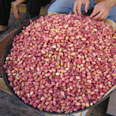
US envoy slams Israel over 'illegal importation of pistachios from Iran'
As Iran’s nuclear threat intensifies, so does our addiction to what seems to be our only dispute with US over Iranian matters: Pistachios
The US and Israel are at odds about Iran’s “weapon”: Ten days ago, US Ambassador to Israel Richard H. Jones wrote a severe letter to Finance Minister Ronnie Bar-On, with copies sent to Prime Minister Ehud Olmert and two of his ministers.
In the letter, Jones accuses Israel of secretly trading with Iran and transferring foreign currency to the country, in direct violation of an Israeli law prohibiting trade with enemy states.
The fuss is over something Iran is famous for, though perhaps less than its nuclear ambitions; namely pistachio nuts. The American government accused Israel of buying Iranian pistachios under the guise of trade with Turkey, despite the US's objection.
The US ambassador’s letter reveals another amazing fact: Israel is the largest per capita consumer of the pistachio. “I am writing to draw your attention to the troubling issue of illegal importation of pistachio of Iranian origin to Israel,” writes Jones.
“Israel is the world’s largest per capita consumer of pistachio nuts and therefore an important market – estimated at $20 million – for pistachio producers. Of the two largest producers of pistachios – the Unites States and Iran – only the US has duty free access to the Israeli market under our Free Trade Agreement…while Iran’s product is banned by Israel’s Trading with the Enemy Act.
"Evidence strongly suggests that most, if not all, of the pistachios entering Israel are actually of Iranian origin.” Despite the close ties between Israel and the US, American producers hold only five percent of the market.
Soccer fans unwittingly supporting the enemy
Jones further claims that though the matter was brought to the Israeli government’s attention, nothing has been done as of yet. Israel, for its part, claims its pistachios are imported from Turkey.
The US Department of Agriculture (USDA) has looked into Turkey’s pistachio production and exportation and concluded that most of it is consumed locally. The small remaining percentage is exported to the US and the EU. Despite these findings Israel still maintains that 83% of pistachios consumed within its borders originate in Turkey.
The ambassador urged Bar-On to enforce the trade act – offering his help in a number of initiatives, including training Israeli customs officers on how to identify an Iranian pistachio.
The matter holds a special significance these days, as countless Israelis sit in front of their television screens watching the European Championship games and gobbling unfathomable amounts of pistachios, unwittingly supporting the enemy.
Every pistachio nut brings Iran another step closer to achieving nuclear capability, and though the US ambassador has placed responsibility for the fiasco primarily on the government’s shoulders, the pistachio crisis may require Israeli citizens to be more discerning in their eating habits.










